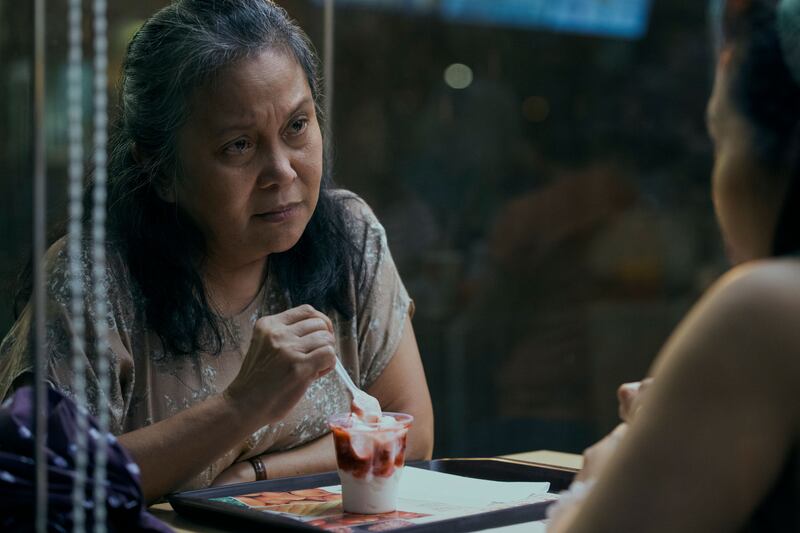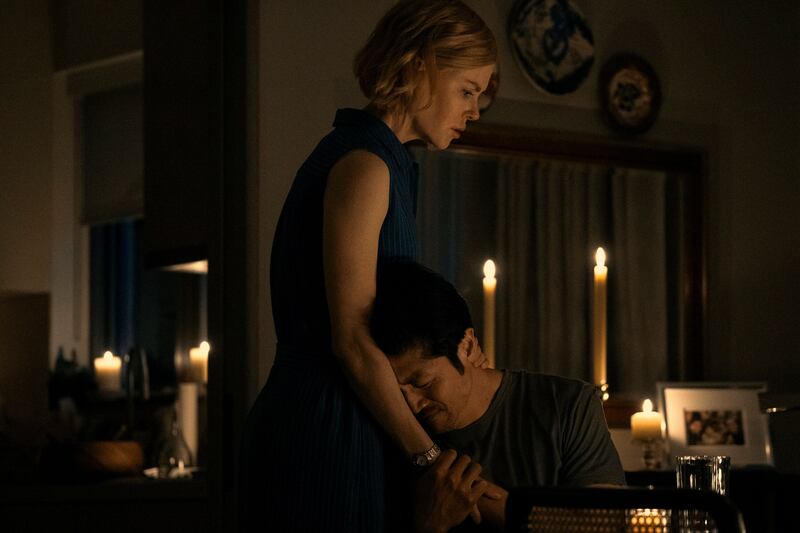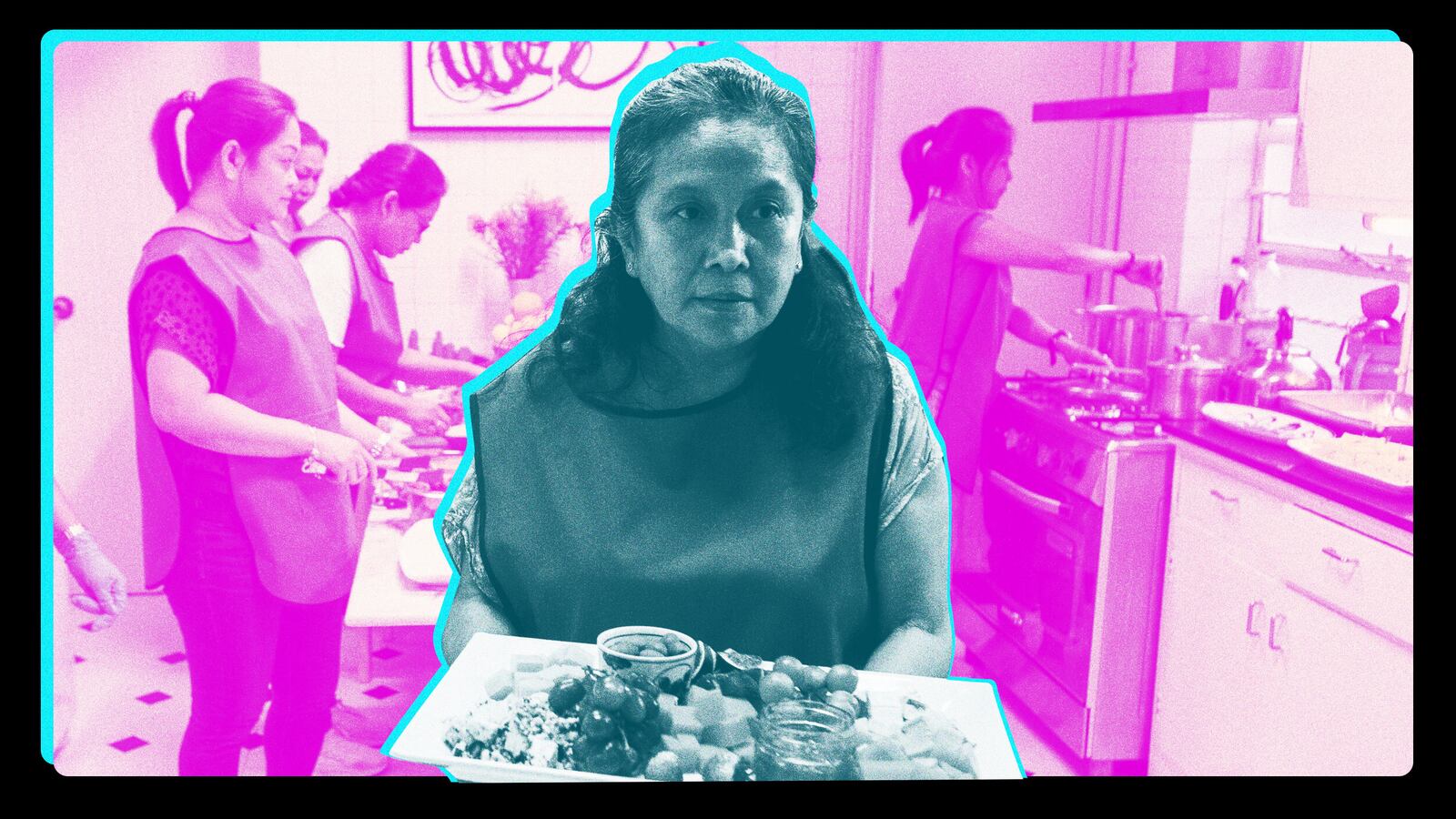Poetic, powerful, and exquisitely shot, Expats’ fifth episode is director and creator Lulu Wang at the peak of her powers. And with the standalone “Central” coming in at 90 minutes long without any of the show’s main characters appearing until the halfway point, it’s also a complete departure from everything we’ve come to expect from Expats thus far—and from TV.
“Central” is a masterpiece. But how in the world did Wang convince Amazon to allow her to make it?
“It was actually the first episode that I pitched to the studio,” Wang tells The Daily Beast’s Obsessed in a recent Zoom interview. “I said, ‘I’m not making this series without this, so you have to say yes. Nicole [Kidman] is not going to show up until 35 minutes in.’ There’s always a little bit of rebel in me, where I’m like, what can I get away with?”
Up until Episode 5, Expats—based on The Expatriates by Janice Y. K. Lee—has followed a community of wealthy expatriates like Margaret (Kidman) and Hilary (Saraya Blue) banding together to figure out life in Hong Kong. That gets more complicated when Margaret’s toddler son Gus (Connor James) goes missing when under the care of a new American nanny, Mercy (Ji-young Yoo), sending the community into a complete spiral. Should Margaret and her family stay to find him, or return home to forget the trauma of Hong Kong?

Margaret played by Nicole Kidman in Expats fifth episode.
Atsushi Nishijima/Prime Video(Warning: Slight spoilers for Expats’ fifth episode, “Central,” below.)
“Central” flips the script: Instead of seeing the story through the eyes of these expats, we watch it through their nannies, housekeepers, and other so-called “helpers” employed to ease their wealthy patrons’ assimilation into Hong Kong society. After Wang pitched this idea, Kidman—who originally recruited Wang to create the show, after her banner Blossom Films optioned the rights to the book—pushed for Amazon to make it a reality.
“Luckily, Nicole also has that same [rebellious] spirit and was incredibly supportive of flipping the perspective,” Wang says. “That was the initial idea: Let’s tell a story where we break out of the expats’ bubbles that the audience has been insulated in. Let’s break away from that so we can look at them—we can now observe them as opposed to seeing the world through their eyes.”

Puri played by Amelyn Pardenilla and Essie played by Ruby Ruiz in the Expat's fifth episode.
Jupiter Wong/Prime VideoThe episode closely follows Margaret’s live-in nanny, Essie (Ruby Ruiz), and Hilary’s maid Puri (Amelyn Pardenilla), as well as a handful of other peripheral characters—like the expats’ rich local friend, Olivia (Flora Chan)—who exist in the realm of these expats. But Wang says that, clearer than the stories of all the helpers, the character of Hong Kong stood out the most when conceiving “Central.”
“My DP and I really felt like we knew that Hong Kong is changing so quickly, and so much of what we’re capturing will be gone very soon. So we had this desire to capture as much as possible, like, ‘Let’s put that in! Let’s put this in,’” Wang says. “I knew that I wanted to capture the umbrella movement, the colors of the umbrellas, that sense of collectivism—a community coming together.”
The episode begins with a crowd of women celebrating their days off, singing and joining in harmony outside while they prepare for an incoming typhoon. For this chorus of noises—a choir of maids singing on the street, babies crying for their nannies, the rumble of an incoming storm—Wang drew from director Robert Altman, “who creates these tapestries and has such specificity of music and setting as a character.”
The placement of “Central” within the series’ run was also intentional. The prior episode, “Mainland,” saw most of the main characters in their home spaces instead of out and about. Wangs says this was meant to set up this massive collage of new characters in Hong Kong.
“Episode 4 is this bottle episode where everybody’s trapped in these small spaces,” Wang explains. “That was the forced limitation—we came up with that idea, and then we came up with the storylines to fit that. It felt really natural that Episode 5, you’d blow it all up. You’d be out in the elements. There’s a typhoon coming, there’s a political movement, there’s this picnic of women who have their days off.”
Wang was particularly invested in developing Essie’s storyline following the disappearance of Gus. Most of Essie’s character has been developed through interactions with Margaret—but in Episode 5, we get to see how the nanny is processing the tragedy, instead.

Essie played by Rubie Ruiz in Expats fifth episode.
Jupiter Wong/Prime Video“I really wanted to explore her grief, and her right or lack of right to grieve—because she’s not the mother, but she is the nanny who raised this child,” Wang says. “She’s not responsible. Yet, what else could she have done?”
Here, Wang compares Expats to her feature directorial debut, The Farewell. “[Essie] is the closest thing to my grandmother in The Farewell,” Wang says, “the heart and soul of this entire series.” Similar to The Farewell—in which a family stages a fake wedding to please a grandmother who has weeks to live—the episode hinges on the quiet emotional resonance of Essie’s reactions to the Woo family.
Right as the episode reaches an emotional climax, Wang pulls the rug out from beneath everyone: There’s a blackout in Hong Kong. Everyone is left without power. Not only was this an important moment to show where everyone lands when the world goes dark—on the street or in a mansion—but it also gave Wang the opportunity to use a new technique to build her characters.

Margaret played by Nicole Kidman and Clarke played by Brian Tee in Expats fifth episode.
Atsushi Nishijima/Prime Video“We found a way to incorporate a source light into the story itself,” Wang says. “For Olivia, she has those emergency lanterns and it gives her that very fluorescent glow. But then for the Woo family, it’s all candlelight. Same with Hilary. It was a fun way to explore light and who uses what kind of light, and what emotions you feel when Olivia has these white fluorescent emergency lights, versus Margaret and Hilary having this more romantic, warm candlelight.”
Expats now heads into its sixth and final episode, where characters like Margaret and Hilary will have to decide whether or not they’d like to stay in Hong Kong or return to wherever they call home. “Central,” then, serves as a perfect penultimate chapter to the series: While the expats have the opportunity to make big decisions, the people in their orbit may never be afforded those same opportunities.






